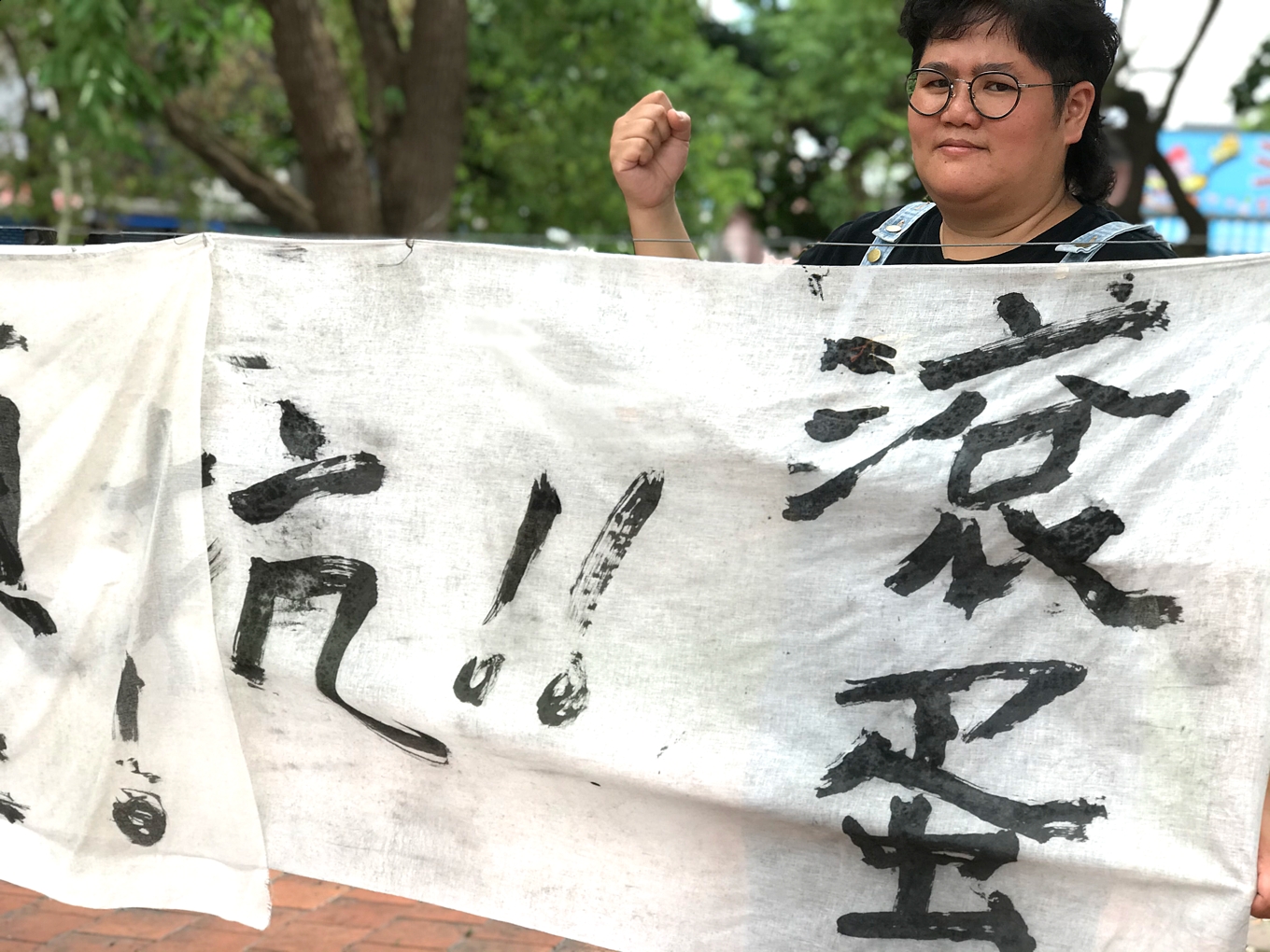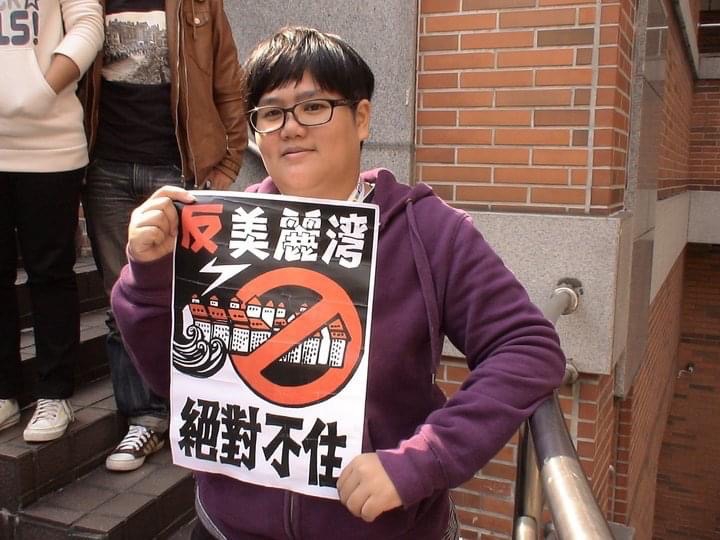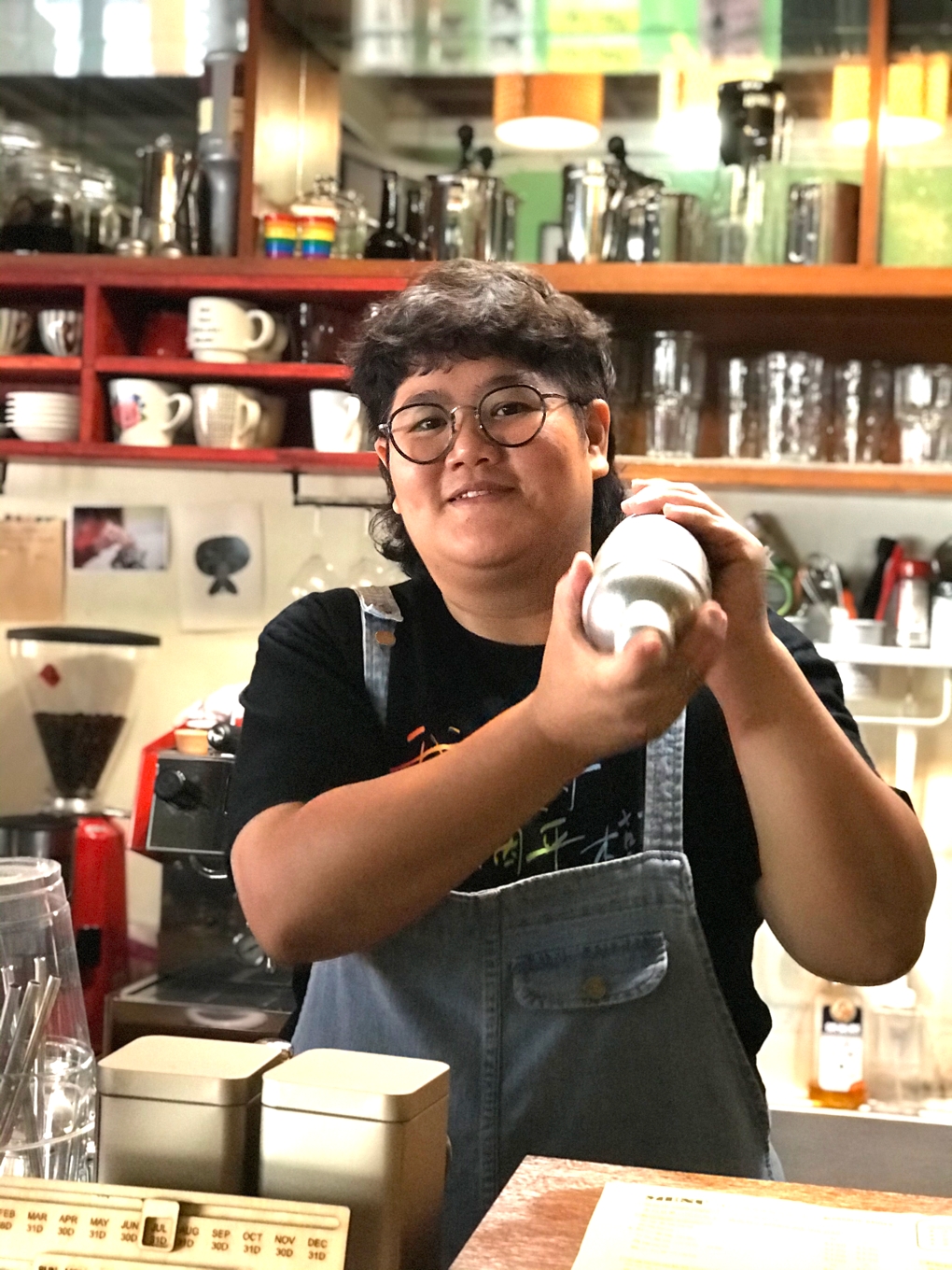Bu Fenghao threw thousands of money to no avail, Ami youth LisinHaluwey stirred up a huge wave of anti-divination bees, insisting that the chicken farm get out of here.
1 sharing
Fenglin, the central town of Hualien County, is the first township in the country and the only one in the east that has obtained international slow city certification. However, as soon as I stepped out of Fenglin Railway Station recently, I saw a white cloth strip of protest that was completely incompatible with the image of "slow living", with angry strokes writing the words "get out of here". The cloth was crackled by the wind, like a protest from the Fenglin people who did not want to stop.
What makes the residents of slow City angry is that more than 90% of the villagers in Fenglin Town are going to invade the Fenglin chicken farm. They surround the town office and the county government, demanding that the county magistrate Xu Hazelwei immediately withdraw his license to set up a factory and ask the chicken farm to "get out of here." The stronghold of this series of protests is "Red Coffee", which is less than 100 meters from the railway station, and the vice president of the self-help Association is the shop owner Lisin Haluwey (Lixin. Haruwei).
From the confusion of self-identity in youth and the restoration of the Ami name after university, Lisin seems to have regained her new life, and has since joined the social movement. From participating in the "Ami Guardian Alliance" and the anti-"Beauty Bay" incident to the recent "anti-divination bee" incident, Lisin pursues justice in her heart and defends her matrilineal homeland.


For Lisin, Bobeng chicken farm not only brings environmental pollution, but also mixed with the crisis of exploitation and occupation of aboriginal traditional areas. (Yang Yuyun _ Photography) Aboriginal identity from working families has seen class inequality since childhood.
"being in the minority" is probably the feeling and label that Lisin can't take off from childhood to majority. Although they are members of the pangcah tribe of the Matai saddle tribe, as his father moved to the Meili area where Hualien Harbor was built, Lisin and his two younger brothers did not grow up in the tribe, but lived in a mixed Han community. "Aborigines" became a constant reminder rather than self-identity.
For example, the school will broadcast inconsiderately: "Aboriginal students please go to the General Office to pick up official stationery." Students often question: "my family is also a laborer, why only you aborigines can receive subsidies?" For example, Lisin was obviously admitted to Hualien Girls' Middle School on the basis of her strength, but her classmates thought that she was admitted by extra points. School education has never shown that the reclamation politics has done multiple and deep harm to the aborigines, causing indigenous students to face all kinds of discrimination and prejudice on campus.
In addition to her aboriginal identity, Lisin comes from a working family and has multiple marginal social positions, which shows her the situation of class inequality. When Lisin was in junior high school, his father was involved in the project of the Snow Mountain Tunnel. He not only left home for a long time, but also was often injured. In addition, due to the delay in the construction of the tunnel due to water seepage, the contractor was unable to apply for money from the government. His father could not get a salary and had no way to help. Bit by bit, in Lisin's eyes, there is unspeakable heartache.
It was not until the university that the "heavenly eyes" were opened to find the answer to "who am I?"
It is just that although the educational policy at that time affirmed her efforts with her achievements, it failed to make her understand the hegemonic violence of the social structure. She swung between self-doubt and self-confidence, social values were like a fog, and she did not know where the exit of life was. At this time, she heard that Donghua University had set up a department of ethnic relations and culture, so she applied for admission and was successfully admitted.
In Lisin's own words, studying Donghua gives her a chance to "open her heavenly eyes" and dispel the fog. Through the courses of sociology, political science and anthropology, many questions about life are answered. The treatment she and her people received, why her father could only work as a dangerous builder, and the damage to the traditional areas of the indigenous people, Chun Chun actually has a historical context to follow. Lisin swims in the sea of knowledge by thinking into driftwood, slowly answering the big question of "who am I?"
Join the social movement and pursue justice in your heart
After class, Lisin is also a member of the Ami student union of Donghua University. Because of her interaction with aboriginal societies of junior college students in other counties and cities, she came into contact with the issues of Sanying and Xizhou tribes, participated in the anti-Soviet Huagao movement, organized youth associations, discussed the imagination of local development, and marched in support of Lesheng.
As a result of these multiple stimuli, a map slowly grew in Lisin's mind. Injustice had taken place in all parts of Taiwan, where aborigines were persecuted, and there were trampled on land justice, aggrieved women, trapped comrades, a culture in peril, and a class that could not break free. Lisin caressed the injured map, and the blood on her fingertips made her youth billow like fireworks.


Because of its overlap with the traditional areas of aborigines, Lisin is one of the comrades-in-arms who have long opposed the hotel development project. (courtesy of Lisin_) Restoration Family names are like freshmen who decided to stay away from politics after understanding the nature of power.
As a sophomore, Lisin watched documentary director Ma Yue. Bi Hao's series "ask Fan's name" made her burst into tears when she met her bosom friend. Ma Yue used the image to pour out the faint sadness of the aborigines, and the pain of "wandering on her own land" stirred up the memory of Lisin's 20-year life. She was now persuaded by the reasoning in the image and decided to restore her family name.
Lisin renamed her name with her parents and two younger brothers, and she changed from Laiwan to Lisin Haluwey. Lisin inherits her grandmother's name and has a ceremonial meaning in Pangcah. It is a relatively neutral name. Lisin said that after resuming her name, she consciously regained her recognition of her maternal culture and connected her relationship with her matrilineal family, giving her a sense of rebirth.
Because she has been a leader in various activities for a long time, some people have long seen Lisin's personal charm and believed that she should engage in political work and make more contributions to her position. At first, Lisin did not object, and her political gesture was to help Ma Yue. Bi Hao elected legislators in the aboriginal district of the plains. After running many tribes, Lisin soon realized that politics is actually the result of negotiation and tradeoff. To "do the right thing" requires the cooperation of all kinds of people, and we should not waste words because of people. Although some of her elders warned her that people engaged in political work should not be addicted to political cleanliness, the young Lisin could not accept advice and was often reluctant to ask for advice modestly.
On the other hand, working in the heart of power, Lisin also finds himself vulnerable to the temptation of power. After introspection, she thought that her understanding of political work was too shallow and that she was not experienced enough, so she decided to bid farewell to political work, return to Hualien, and put her feet on the ground to continue Hualien's future.


Lisin said that the company has not yet heard the voices of Hualien people. (photography / Lin Jiyang) "Red Coffee" is not only an issue dissemination station, but also a petri dish of ideas
Red Coffee, located on Zhongshan Road in Fenglin Town, is a space jointly operated by Kawah and Lisin. They both grew up with similar backgrounds and were discriminated against during their schooling. Kawah is a pangcah born in Fenglin. When she was growing up, she was only required to concentrate on her studies and did not have the opportunity to get to know her background and care about the life around her. When we open a coffee shop, we naturally want to turn this space into an issue dissemination station and a petri dish for the next generation to think independently.
Lisin says that in fact, Fenglin is a traditional field of the Ami, but in the Japanese occupation era, because of the development of the tobacco and sugar industries, there were more Hakka and Minnan immigrants, and the town became an administrative center, but the tribes were regarded as marginal areas. In addition, there are many social service groups with religious backgrounds in the rural areas. During the "Love Family referendum", the church and its children invited Grandpa and Grandma of Fenglin to participate in the co-signing, and all we could hear was the saying of the Family League.
So "Red Coffee" advocated breaking down ethnic barriers and gender solidification after its opening. Kawah has a documentary major and mainly plans in-store video activities, while Lisin is in charge of topic lectures, concerts and book clubs. There are many video, gender, social and literary books to borrow, hoping to become a friendly space for young people to explore themselves. But it was also because the colors of holding lectures and showing movies were so bright that there was a collision in the early days, such as the anti-nuclear flag posted outside the store in the first year of opening the store was pulled away, and people choked, "otherwise you should not blow the air conditioner." this made the two more sure that the plan was imperative.

- Prev

The charm of the 2020 Taiwan International Hot Air Balloon Carnival can not stop the opening day and set off 120000 people.
So far this year, the world's first "2020 Taiwan International Hot Air Balloon Carnival" was officially unveiled on July 11. It will not shrink for 51 days in the morning with 19 domestic and foreign hot air balloons flying together at Luye High platform.
- Next

Advance deployment of the forefront Huadong tourism big attack
(Taiwan TB News Network/Reporter Chen Nianzu) Huadong tourism conditions are unique, in Taiwan epidemic release, revitalization of triple coupons officially on the road, Chinese people can spend east tourism as the first choice. The Eastern Joint Service Center of the Executive Yuan offers a variety of sightseeing activities for Hualien and Taitung.
Related
- A course of planting techniques and methods on how to grow carrots
- How to plant the latest tulips?
- Is it better to pick tea in the morning or in the afternoon? When is the best time for tea to be picked? what is the third or fifth tea?
- Launch Yuanxiao Happy combination Haocha + Tea Yuan healthy Taste
- Penghu Tourism "Fireworks 20 Parade with You"
- 2022 West Lake Happiness holds "Digital Revitalization Voucher" and draws iphone13 and laptop.
- Banqiao Fuzhou social houses are designed to change start-up combined with police elimination to create a safe and livable environment
- The convenient measure of "mechanical weeding" in Xinbei has been abused and the Agriculture Bureau has imposed heavy penalties on the illegal land consolidation.
- Changgeng University Joins Hands with Four Memory Factories to Rescue Memory Talent Shortage
- The list of Taiwan's top 100 MVP managers is listed by the Director-General of the Farmers' Association of Sanxia District.

